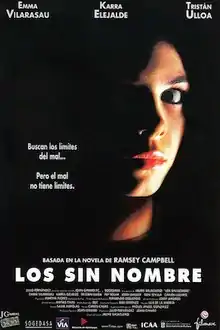The Nameless (film)
The Nameless (Spanish: Los Sin Nombre; Catalan: Els sense nom) is a 1999 independent Spanish horror film directed by Jaume Balagueró and starring Emma Vilarasau, Karra Elejalde, and Tristán Ulloa. Its plot follows a mother who receives a phone call from her believed-deceased daughter five years after her apparent ritualized murder. It is based on the 1981 horror novel by English writer Ramsey Campbell.
| The Nameless | |
|---|---|
 Original Spanish poster | |
| Directed by | Jaume Balagueró |
| Produced by | Julio Fernández |
| Written by | Jaume Balagueró |
| Starring | Emma Vilarasau Karra Elejalde Tristán Ulloa |
| Cinematography | Xavi Giménez |
| Edited by | Luis de la Madrid |
| Distributed by | Filmax (Spain)
|
Release date |
|
Running time | 102 minutes |
| Country | Spain |
| Language | Spanish |
| Budget | $900,000 (estimated) |
| Box office | $3.9 million |
Plot
The gruesomely mutilated body of a girl is found in a manhole by Spanish police. The parents of missing six-year-old Angela Gifford, local editor Claudia and her British husband Marc, are duly notified. The identification is only deemed possible thanks to a bracelet and a four-centimeter leg length discrepancy. All other identifying traits are missing and the body shows needle insertions and acid burns, apparently inflicted antemortem.
Five years later, Claudia is still haunted by the tragedy. She is living alone, addicted to tranquilizers and stalked by her possessive ex-boyfriend Toni. One day, she receives a desperate phone call from someone identifying herself as her presumed dead daughter and begging to be rescued. Intrigued by the resemblance to Angela's voice and the mention of a seaside location where she used to take her daughter, Claudia visits the site. The nearby deserted clinic reveals grotesque angelic imagery and an orthopedic boot ostensibly left for her to find. Claudia contacts Massera, the detective who probed into Angela's disappearance. Despite his recent discharge from the force, he agrees to investigate.
Massera's research lends credibility to the hypothesis that Angela is alive, since a girl with similar characteristics disappeared around the same time and could have been used to fake Angela's death. A visit to a Jesuit expert in the Pontifical University uncovers a bizarre cult called The Nameless. It was first documented in Liverpool in 1962 and led by Argentinian expatriate Santini, whose scientific approach to ponerology went far beyond the activities of his original London occult circles. He believed in absolute evil and the path to reverse sanctity through heinous acts. He also advocated radical ego stripping to the point of losing one's name, thus the nameless sobriquet. Santini was arrested in 1982 for raping and mutilating two children. His project had links to the Thule Society and an accomplice of his, a neurologist from the Dachau concentration camp, was later released for lack of evidence.
Claudia and Massera cross paths with occult tabloid journalist Quiroga, who receives a videotape labelled with Claudia's phone number. It contains a snuff film featuring a young female victim, followed by surreptitious footage of Claudia visiting the derelict clinic. Fearing for her safety and sanity, Claudia spends the night in Massera's apartment. Their bond deepens when she learns he was widowed the previous year and is as despondent as herself. Meanwhile, her unhinged ex-boyfriend is approached in a bar by a hideously disfigured man whose stare had disturbed Claudia in an earlier scene. This stranger eggs Toni on to entering her apartment uninvited, and is joined by accomplices as they leave.
Claudia and Massera visit Santini in prison. His already disturbing countenance is compounded by a skin disease inoculated during his forceful internment in Dachau. He speaks to Claudia in riddles, obliquely mentions his acquaintance with Angela, recounts his confinement in a cobalt capsule in Dachau, and extols evil and suffering as sources of enlightenment. Claudia's pleas elicit his enigmatic advice to find Angela 'where it all began'. It soon becomes apparent that Santini's followers are still active; upon returning to her apartment, Claudia and Massera find Toni butchered, along with another cryptic message.
The trail leads to the now-abandoned hotel where Angela was conceived, thereby unveiling Santini's mysterious clue. Quiroga scouts ahead following indications by the Dachau neurologist but is quickly subdued and killed by cultists. Massera arrives soon thereafter and is murdered offscreen. Claudia is lured there by a phone call from Angela. She is greeted by cult members, including Angela's father. Marc reveals that everything was planned by the cult: conceiving Angela, raising her to be pure and innocent, kidnapping and subjecting her to abuse in their quest for a pure evil being, and finally leading Claudia to their den. Claudia confronts her visibly perverted daughter, whose task is now to commit the "ultimate atrocity" she was groomed and conditioned for matricide. Instead, Angela shoots Marc through the door and briefly seems to resist the indoctrination – before proclaiming she has a plan more sinister than the cult's own. She cynically tells Claudia "I will call you [again]", before putting the gun in her mouth and pulling the trigger.
Cast
- Emma Vilarasau as Claudia Gifford
- Karra Elejalde as Massara
- Tristán Ulloa as Quiroga
- Toni Sevilla as Franco
- Brendan Price as Marc Gifford
- Jordi Dauder as Forense
- Pep Tosar as Toni
- Carlos Lasarte as Santi
- Josep Maria Domènech as Romero
- Jessica Del Pozo as Angela Gifford
Release and awards
The film appeared at festivals worldwide, winning several awards including the Méliès d'Or for Best European Fantastic Film and Best Film at the Fant-Asia Film Festival. Miramax bought the US distribution rights for the film in 1999, but did not release it on home video until 2005.
